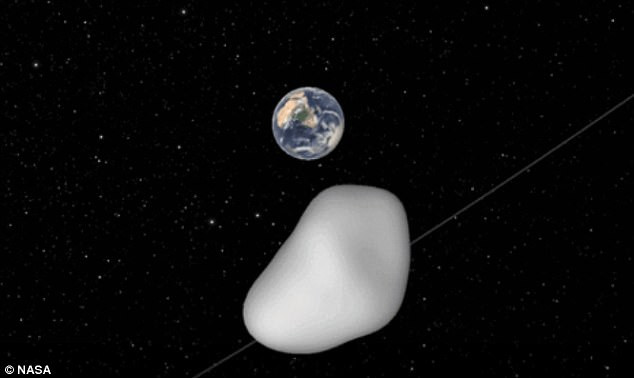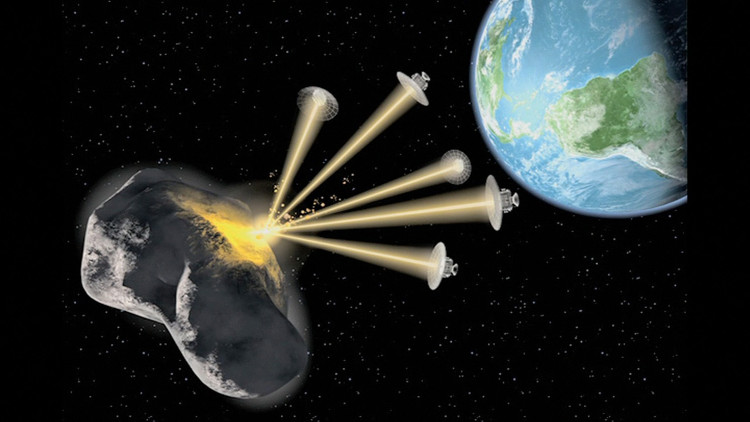October 12, 2017 NASA tests the Earth defense system
Taking advantage of the time when the 2012 TC4 meteorite passed, NASA will try to train the ability to confirm the orbits of the asteroids in the universe.
Recently, NASA predicted a meteorite capable of hitting Earth on October 12, 2017. Specifically, it is the 2012 TC4 asteroid with a diameter of 30m, and it will pass through the Earth at an extremely close distance - only 6,800km (only 1/56 times the distance to the Moon).
According to a NASA spokesperson, this is a better opportunity to test the "planetary defense system" - which is used to detect meteorites capable of causing Earth to experience disaster.

Simulation meteorite 2012 TC4.
"Science can predict when a meteorite will approach the Earth and pass safely, with the data collected" - quoted Michael Kelley, NASA's TC4 campaign specialist.
"But this time, we want to use meteors to re-examine the asteroid detection system globally , in order to reevaluate the possibility that we actually discovered a dangerous meteorite for Earth."
According to Professor Vishnu Reddy - campaign leader: "This is a great effort by many observatories, laboratories and prestigious universities all over the world. Now we can collect data and assess the possibilities. Observe the nearby Earth objects ".
It is known that the first 2012 TC4 meteorite appeared in 2012. It passed through the Earth, but at a distance far away and faded during the past 5 years.

This is a better opportunity to test "planetary defense system".
But this time, 2012 TC4 started approaching Earth, with enough distance to observe with a large periscope. In particular, experts are hoping that the Earth's defense system will help reduce errors, when predicting the meteor's approach distance.
"This is a perfect goal to practice, because we know TC4's ability to access the Earth, it is just unclear exactly how it will go," said Paul Chodas, project manager.
- Video: US missile defense system shows China must be
- The best missile defense systems in the world
- The power of the THAAD missile defense system
- The 25m-wide meteorite grazes the Earth on the night of Halloween
- Very simple health test tips
- Difficult to confirm satellite data, NASA asked for help from people around the globe
- Evolutionary defense system in earring plants
- Lockheed Martin's air defense system
- NASA established an Earth defense unit against the risk of collisions with meteors
- Space research centers are simulating a meteorite situation that attacks the Earth
- NASA recruits people just to lie in bed
- NASA continues to hunt for dangerous meteors
 Van Allen's belt and evidence that the Apollo 11 mission to the Moon was myth
Van Allen's belt and evidence that the Apollo 11 mission to the Moon was myth The levels of civilization in the universe (Kardashev scale)
The levels of civilization in the universe (Kardashev scale) Today Mars, the sun and the Earth are aligned
Today Mars, the sun and the Earth are aligned The Amazon owner announced a secret plan to build a space base for thousands of people
The Amazon owner announced a secret plan to build a space base for thousands of people What would happen if you dug a hole through the Earth and jumped in?
What would happen if you dug a hole through the Earth and jumped in?  Chilling discovery of cosmic object that almost brought the Earth to 'apocalypse'
Chilling discovery of cosmic object that almost brought the Earth to 'apocalypse'  The Sun goes into hibernation, will the Earth usher in a new ice age?
The Sun goes into hibernation, will the Earth usher in a new ice age?  Discovery of space object powerful enough to tear apart the Earth
Discovery of space object powerful enough to tear apart the Earth  NASA to test 'pneumatic brakes' for Mars lander
NASA to test 'pneumatic brakes' for Mars lander  Breakthrough discovery of planet with more water than Earth
Breakthrough discovery of planet with more water than Earth 